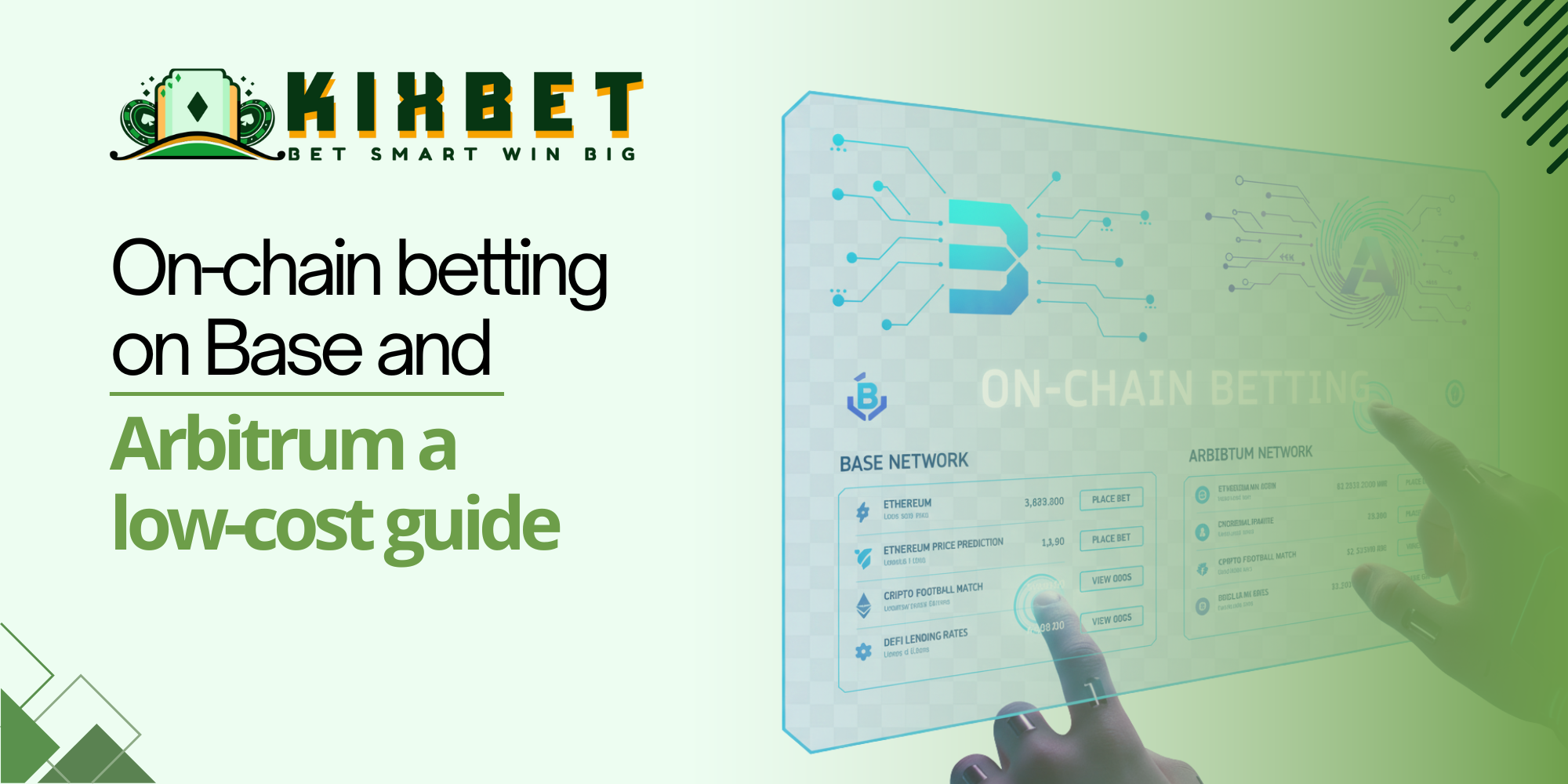This guide explains On-chain betting on Base and Arbitrum with a focus on low fees, transparency, and security. It is educational content and not financial or legal advice.
On-chain betting brings wagers to public blockchains. As a result, transactions become transparent, verifiable, and non-custodial. Because smart contracts settle outcomes, users gain more control and auditability. However, costs and safety practices still matter. Therefore, choosing the right chain and tools is essential.
This low-cost guide focuses on Base and Arbitrum. Both are Ethereum Layer 2 networks designed for scalability and low fees. Consequently, they are strong choices for On-chain betting. Moreover, they integrate with familiar wallets, explorers, and analytics tools. In practice, this makes onboarding simple.

On-chain betting on Base and Arbitrum a low-cost guide
What is On-chain betting?
On-chain betting uses smart contracts to create, accept, and settle bets. Funds move through blockchain transactions rather than custodial bookmakers. Because settlement rules live in code, outcomes can be verifiable. In addition, payment flows are transparent on public explorers.
Core building blocks
- Smart contracts that define odds, payouts, and settlement logic.
- Oracles that deliver reliable event results to the blockchain.
- Non-custodial wallets that hold your funds and initiate transactions.
- Explorers that show on-chain history for full transparency.
Benefits at a glance
- Transparency: you can verify rules and settlement on-chain.
- Self-custody: you control private keys and funds.
- Composability: protocols can integrate with other DeFi tools.
- Global access: wallets connect from many regions, subject to local laws.
Nevertheless, risks exist. Smart contract bugs, oracle disputes, and regulatory limits can affect your experience. Thus, careful research and responsible use are vital.
Why Base and Arbitrum for low fees
Base and Arbitrum are Ethereum Layer 2 networks. They process transactions off the Ethereum main chain and post proofs back to Ethereum. Therefore, they reduce fees while preserving security assumptions. In many cases, fees are a fraction of mainnet costs.
Base is developed with support from Coinbase and focuses on simple onboarding and developer tooling. See the official site at base.org. Arbitrum is one of the largest L2 ecosystems by activity and TVL. Explore it at arbitrum.io.
To compare live costs, you can check l2fees.info. Additionally, use explorers like basescan.org and arbiscan.io for transaction verification. These tools make audits and fee planning straightforward.
Network considerations
- Base: low fees, strong fiat on-ramps via Coinbase, and growing dapp support.
- Arbitrum: mature ecosystem, many DeFi integrations, and robust tooling.
Both networks are EVM-compatible. Consequently, common wallets and libraries work out of the box. This reduces friction for first-time users of On-chain betting.
Getting started step by step
1) Choose a non-custodial wallet
Pick a wallet you trust and can secure. Popular options include MetaMask, Coinbase Wallet, and Rainbow. Hardware wallets such as Ledger and Trezor add another layer of protection.
2) Add Base and Arbitrum networks
Next, add L2 networks to your wallet. You can do this manually or via Chainlist. Always verify RPC details before saving. Then, test with a small transaction to confirm connectivity.
3) Fund your wallet
You need ETH on the target L2 to pay gas. You can bridge funds from Ethereum or buy directly on an exchange that supports withdrawals to Base or Arbitrum. For bridging, use the official portals: bridge.base.org and bridge.arbitrum.io. For fiat on-ramps, consider Coinbase or other reputable exchanges in your region.
4) Research betting protocols
Before placing any wager, review the protocol’s documentation and audits. Check for public code on GitHub. Also search for audits from firms such as OpenZeppelin or Trail of Bits. Moreover, look for active communities on Discord or forums. Healthy discussion often signals ongoing maintenance.
Understanding fees and how to keep them low
On-chain betting incurs network fees. Fortunately, Base and Arbitrum are designed to minimize gas costs. Still, it helps to optimize your actions. With several simple habits, you can reduce expenses even more.
Track and time your transactions
- Check live gas on l2fees.info before busy events.
- Avoid peak congestion when possible. Consequently, you may pay less to execute.
- Prefer batching actions when the dapp supports it. Fewer transactions often mean fewer fees.
Use efficient approvals and signatures
- Approve token allowances only as needed. Do not grant unlimited approvals by default.
- Periodically review allowances with revoke.cash. This can reduce risk and exposure.
- When available, use permit-style signatures (EIP-2612) to cut extra transactions.
Choose the right tokens and routes
- Keep a small buffer of ETH on L2 for gas. Otherwise, you may get stuck mid-flow.
- Swap with reputable DEXs such as Uniswap on Base or Arbitrum if you need betting tokens.
- Compare bridge routes if moving funds. Official bridges are safer by default, while third-party routes may offer speed. However, evaluate risk carefully.
Security, compliance, and responsible use
Security comes first in On-chain betting. Because you control your keys, you must defend them. Consequently, adopt strong habits and verify every signature.
- Use hardware wallets when possible for higher-value funds.
- Enable phishing protections in your browser and verify URLs letter by letter.
- Bookmark official sites, such as base.org, arbitrum.io, basescan.org, and arbiscan.io.
- Verify contract addresses on explorers before interacting.
- Never share seed phrases or private keys. No support agent needs them.
Additionally, betting is regulated. Laws differ by country and state. Therefore, check local rules before using any protocol. Some apps restrict access based on jurisdiction. Respect these restrictions and the terms of service.
Finally, bet responsibly. Set budgets. Do not chase losses. If needed, seek help from support resources in your region.
How oracles and data feeds impact settlement
Oracles report results to the blockchain. The reliability of those feeds affects settlement quality. For example, many protocols use Chainlink for price feeds. Others may use custom result reporters or dispute systems.
Because oracle design varies, read the docs. Ask how disputes are handled. Moreover, check whether the protocol has insurance or backstops. Transparent processes reduce uncertainty and improve trust.
Discovering On-chain betting apps and related markets
On-chain betting spans sports, esports, and event prediction. Some platforms focus on sports markets. Others cover broader topics. While availability varies by chain and region, you can research via explorers, analytics, and community hubs.
Where to research
- Block explorers: BaseScan and Arbiscan for contract lookups.
- Analytics: Dune dashboards for protocol stats and user flows.
- Indexing: The Graph subgraphs for on-chain data queries.
- Ecosystem listings: official Base docs and Arbitrum docs often link to dapps.
Some adjacent platforms include decentralized prediction markets. For instance, Polymarket operates on-chain markets for real-world events. Additionally, legacy projects like Augur contributed to early design patterns. Nevertheless, always confirm chain support and legal access in your location.
Practical workflow for a first bet on L2
To make your first On-chain betting transaction efficient, keep the flow simple. The following checklist helps you avoid avoidable fees and errors.
Pre-flight checks
- Confirm the site URL and the contract address via the explorer.
- Ensure you hold a small ETH buffer on Base or Arbitrum for gas.
- Read the market rules and settlement logic in the app’s docs.
- Check recent transactions or volumes to assess liquidity.
Funding and approvals
- Bridge funds with Base Bridge or Arbitrum Bridge.
- Swap tokens on a reputable DEX if the market requires a specific asset.
- Set minimal token approval amounts when prompted.
Placing and managing the bet
- Review gas estimates before confirming the transaction.
- Wait for confirmation and then verify on BaseScan or Arbiscan.
- Track settlement timeframes and any dispute windows described in the market.
After settlement, consider reducing allowances you no longer need. Additionally, export notes or transaction hashes for your records. Good documentation helps, especially for compliance and tax reporting in your jurisdiction.
Risk management for On-chain betting
Smart risk management makes On-chain betting more sustainable. It also protects your capital against unforeseen events. Use the following practices consistently.
- Bankroll discipline: set a budget and size bets conservatively.
- Diversification: avoid concentrating all value in one protocol.
- Counterparty awareness: understand who runs the oracle and UI.
- Smart contract risk: prefer audited code and open repositories.
- Liquidity risk: exit may be expensive if markets are thin.
- Operational risk: keep backups of seed phrases in secure, offline locations.
Moreover, evaluate token volatility if payouts use non-stable assets. Price swings can change real returns. Consequently, some users prefer stablecoin-denominated markets where available.
Tools that help you stay informed
Knowledge compounds. Therefore, use public data and dashboards to track market health, fees, and contract events. Over time, you will bet more efficiently.
- Explorers: BaseScan, Arbiscan, and Etherscan for cross-checks.
- Analytics: Dune community dashboards for activity and usage.
- Market data: CoinGecko for token prices and liquidity.
- Ecosystem overviews: DefiLlama for TVL and protocol listings.
- Documentation: Base docs and Arbitrum docs for technical details.
Additionally, many communities publish updates on X and Discord. However, beware of impersonators. Always cross-check announcements with official websites and docs.
Frequently asked questions
Is On-chain betting legal everywhere?
No. Laws vary by region. Therefore, study local regulations and follow the rules in your jurisdiction. Many platforms restrict users from certain countries or states.
Which is cheaper for On-chain betting, Base or Arbitrum?
Fees change over time. Both are usually inexpensive compared to Ethereum mainnet. Check live data on l2fees.info before you transact.
How do I verify a contract?
Use the market’s contract address from the official site. Then, search it on BaseScan or Arbiscan. Verified source code and active transactions add transparency.
What happens if the oracle is wrong?
Every protocol has dispute procedures. Read the docs. Some use multi-stage dispute windows. Others rely on community or third-party arbitration. Consequently, governance design matters.
Can I use stablecoins for On-chain betting?
Often yes, if the protocol supports them. Confirm accepted tokens in the market UI and documentation. Also review the stablecoin’s risk model and issuer disclosures.
Cloudbet
Check out Cloudbet promotions.
Bet88
Check out Bet88 promotions.
DuckDice
Check out DuckDice promotions.
Conclusion: a simple, low-cost path to On-chain betting
On-chain betting offers transparency, control, and global access. Base and Arbitrum make it practical because fees are low and tooling is familiar. With a careful setup and steady habits, you can reduce costs and risks. Moreover, you can verify everything on-chain as you go.
Start small. Test each step. Use explorers, dashboards, and docs. Consequently, you will build confidence and resilience. Above all, comply with local laws and bet responsibly.
Check out our Davegas review: Davegas Casino Betting Site: Features and Advantage
Don’t forget to also check out: Best Crypto Betting Apps: Licensing, Geoblocking & KYC Tips
Sources
- Base official site
- Arbitrum official site
- Base documentation
- Arbitrum documentation
- BaseScan block explorer
- Arbiscan block explorer
- L2 Fees live tracker
- Chainlink oracles
- Dune Analytics
- The Graph protocol
- OpenZeppelin audits and libraries
- Revoke.cash approvals manager
- Uniswap app
- CoinGecko market data
- DefiLlama analytics
- Etherscan
- Polymarket
- Augur
- MetaMask
- Coinbase Wallet
- Rainbow Wallet
- Base Bridge
- Arbitrum Bridge














